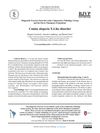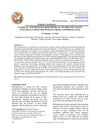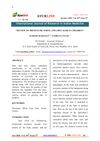 1 citations,
October 2023 in “International journal of Ayurveda and pharma research”
1 citations,
October 2023 in “International journal of Ayurveda and pharma research” Herbal medications might be safer and more effective for hair loss than synthetic treatments.
 1 citations,
January 2019 in “The International Journal of Lower Extremity Wounds”
1 citations,
January 2019 in “The International Journal of Lower Extremity Wounds” Artificial dermal template treatment can stimulate complete skin and hair follicle regrowth.
 1 citations,
April 2018 in “Revista da Sociedade Portuguesa de Dermatologia e Venereologia”
1 citations,
April 2018 in “Revista da Sociedade Portuguesa de Dermatologia e Venereologia” Hidradenitis suppurativa is a chronic skin condition more common in women, linked to genetics and lifestyle factors, and associated with various other health issues.

research Hair
1 citations,
January 2016 in “Springer briefs in molecular science” The document suggests using safer, plant-based hair products instead of harmful synthetic ones.
 1 citations,
November 2014 in “Elsevier eBooks”
1 citations,
November 2014 in “Elsevier eBooks” Future research should focus on making bioengineered skin that completely restores all skin functions.
 1 citations,
October 2014 in “Skin Pharmacology and Physiology”
1 citations,
October 2014 in “Skin Pharmacology and Physiology” People with alopecia areata have higher levels of osteopontin, which might be important in the disease's development, but this doesn't relate to how severe the disease is.
 1 citations,
January 2009 in “Elsevier eBooks”
1 citations,
January 2009 in “Elsevier eBooks” The document concludes that a deeper understanding of skin aging and photodamage is needed to create better skin treatments.
 1 citations,
January 2005 in “Side effects of drugs annual”
1 citations,
January 2005 in “Side effects of drugs annual” The document concluded that various dermatological treatments have different effectiveness and side effects, with some causing irritation, allergic reactions, or systemic effects.
 1 citations,
November 2002 in “Neurosurgery Clinics of North America”
1 citations,
November 2002 in “Neurosurgery Clinics of North America” The article concludes that cranial reconstruction should aim for the best aesthetic result, using various techniques tailored to individual needs and conditions.

COVID-19 can cause significant hair loss.
 April 2024 in “Cell death and differentiation”
April 2024 in “Cell death and differentiation” Cell death shapes skin stem cell environments, affecting inflammation, repair, and cancer.
 February 2024 in “Frontiers in physiology”
February 2024 in “Frontiers in physiology” Modifying certain signals in the body can help wounds heal without scars and regrow hair.
 February 2024 in “Asian journal of medical sciences”
February 2024 in “Asian journal of medical sciences” Proper hygiene, adequate sleep, and self-care can reduce common skin diseases.
 January 2024 in “Brazilian journal of veterinary pathology”
January 2024 in “Brazilian journal of veterinary pathology” The dog likely has a condition similar to Canine alopecia X.
 November 2023 in “International Research Journal of Modernization in Engineering Technology and Science”
November 2023 in “International Research Journal of Modernization in Engineering Technology and Science” Herbal shampoos clean and improve hair naturally without harmful side effects.
 July 2023 in “International journal of current research in chemistry and pharmaceutical sciences”
July 2023 in “International journal of current research in chemistry and pharmaceutical sciences” The shampoo made with Bhringraj leaf and other natural ingredients shows promise as a natural dandruff solution.
 July 2023 in “International journal of pharmacognosy and life science”
July 2023 in “International journal of pharmacognosy and life science” The herbal hair oil made from various plants might be a good alternative to synthetic hair loss treatments.
 May 2023 in “International journal of pharmaceutical sciences and medicine”
May 2023 in “International journal of pharmaceutical sciences and medicine” Sunflower oil was found to promote hair growth in mice with hormone-induced hair loss.

The document concludes that the girl's hairlessness is likely inherited from her parents.
 January 2023 in “Trakia Journal of Sciences”
January 2023 in “Trakia Journal of Sciences” Goats infested with lice showed anemia and skin issues, which improved after treatment.
 April 2021 in “Arab Journal of Nuclear Sciences and Applications/Arab Journal of Nuclear Sciences and Applications ”
April 2021 in “Arab Journal of Nuclear Sciences and Applications/Arab Journal of Nuclear Sciences and Applications ” Repeated use of protein hair conditioner with heat or gamma irradiation can harm skin and hair health in rats.
 October 2020 in “Ayurline: international journal of research in indian medicine”
October 2020 in “Ayurline: international journal of research in indian medicine” Poor quality hair products contribute to premature greying in children.

The document describes a rare case of IFAP syndrome, a genetic condition with symptoms of hair loss, light sensitivity, and scaly skin.
 January 2020 in “Cosmetics”
January 2020 in “Cosmetics” Ecklonia cava extract may protect the scalp from pollution and improve its health.
 January 2020 in “Der Pharmacia Lettre”
January 2020 in “Der Pharmacia Lettre” Nanoparticle-based herbal remedies could be promising for treating hair loss with fewer side effects and lower cost, but more research is needed.

New treatments for hair loss show promise, including plasma, stem cells, and hair-stimulating complexes, but more research is needed to fully understand them.
 January 2018 in “Stem cell biology and regenerative medicine”
January 2018 in “Stem cell biology and regenerative medicine” The nucleus is key in controlling skin growth and repair by coordinating signals, gene regulators, and epigenetic changes.
 January 2018 in “Stem cell biology and regenerative medicine”
January 2018 in “Stem cell biology and regenerative medicine” The conclusion is that the nuclear lamina and LINC complex in skin cells respond to mechanical signals, affecting gene expression and cell differentiation, which is important for skin health and can impact skin diseases.
 June 2017 in “Experimental and Therapeutic Medicine”
June 2017 in “Experimental and Therapeutic Medicine” The anti-CXCL4 antibody helps mice grow hair faster and prevents hair loss.
 April 2017 in “The journal of investigative dermatology/Journal of investigative dermatology”
April 2017 in “The journal of investigative dermatology/Journal of investigative dermatology” CD101 is highly effective in treating dermatophytosis in guinea pigs.






























